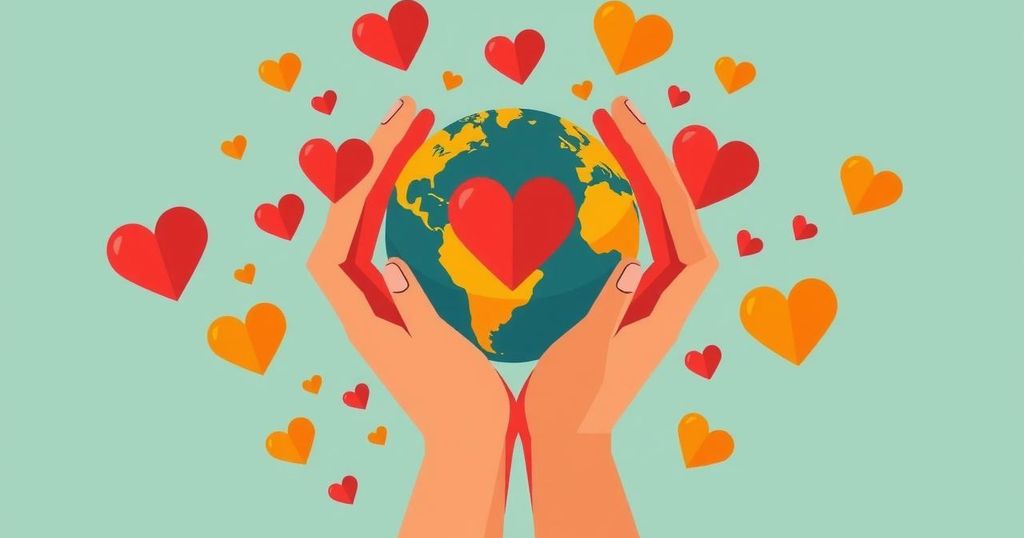Recent cuts to U.S. aid in Guatemala have increased the importance of Irish assistance as local organizations encounter growing challenges. Trocaire’s efforts to support disaster risk management and food security are threatened. Indigenous communities, especially the Mayans, are severely impacted by climate change, underscoring the necessity for sustained humanitarian support and advocacy against corporate land exploitation.
Donald Trump’s recent cuts to U.S. development funds in Guatemala have heightened the significance of aid from Ireland, as noted by an Irish charity. Aid workers expressed concerns that these funding reductions would exacerbate existing issues, threatening the efforts of local partners engaging in developmental projects. The U.S. contributed over $60 million in humanitarian assistance to Guatemala in 2023, but anticipated cuts to over 90 percent of USAID contracts pose grave challenges for a nation already vulnerable to climate change.
Martin Larrecochea, Trocaire country director for Guatemala, highlighted that the loss of U.S. support will add strain to the organization’s efforts in disaster risk reduction and food security. He emphasized Guatemala’s dependence on U.S. aid, noting that local partners have begun seeking additional support from Trocaire due to the withdrawal of funds. Larrecochea stated, “The U.S. was one of the big donors for projects in relation to disaster risk reduction and food security… so that space will be empty in some way.”
Chris O’Connell, a policy adviser with Trocaire, remarked that the impact of U.S. funding cuts would be extensive, reducing humanitarian work across the board. He articulated his concern that such reductions would disproportionately benefit powerful corporations and corrupt elites in Guatemala, disrupting the traditional aid mechanisms that serve vulnerable populations.
The effects of climate change are particularly pronounced in Guatemala, where extreme weather events disrupt agriculture. The indigenous Mayan population, among the country’s most impoverished groups, is acutely affected by shifts in climate patterns. In a remote village inhabited by Qʼeqchi Mayans, families struggle with unpredictable weather that jeopardizes their livelihoods.
Miriam Estela, a 13-year-old student, experiences first-hand the adverse impacts of failing crops on her education as her father seeks work in distant regions. Despite these challenges, she remains determined to advance her studies, expressing her aspirations in fields such as teaching or engineering. Her mother, Ilma, conveyed the community’s broader struggles with climate-induced illnesses, stating, “It’s affecting the family, not just mine, but in the community.”
Julio, Miriam’s father, is troubled by the prospect of his children enduring the same hardships he faces. He is determined to provide a better future for his family and worries that climate change will obstruct their paths. Leonardo Cajbom, the village’s spiritual leader, articulated the generational struggle against climate change, distinguishing it from the violence of the past.
Several initiatives have been undertaken in La Paz to prepare residents for severe weather conditions, including improvements in infrastructure like a bridge replacing a wooden boat. Dr. Conchita Reyes emphasized the urgency of addressing climate change’s impacts on impoverished communities, including rising levels of malnutrition among children. The community is adopting measures to mitigate climate damage while respecting their cultural ties to the land.
Trocaire has been instrumental in supporting land rights for the Mayans, helping them resist corporate encroachments on their livelihoods. Local communities, particularly in El Estor, express alarm over potential mining activities and their environmental ramifications, calling for rights against foreign exploitation of their resources. Gabriel Xi Pochan underscored the rights of Guatemalans to refuse foreign companies’ demands, advocating, “If this is how he is doing it, we have the right to say we don’t want companies from the U.S.”
In conclusion, the significant cuts to U.S. aid under the Trump administration have intensified the necessity for Irish support in Guatemala, a nation grappling with the severe repercussions of climate change and development challenges. The efforts of organizations like Trocaire are increasingly vital as they strive to fill the void left by reduced U.S. funding. The ongoing struggles faced by indigenous communities underscore the urgent need for focused humanitarian response and advocacy for land rights, highlighting broader issues of environmental justice and equity.
Original Source: www.breakingnews.ie






